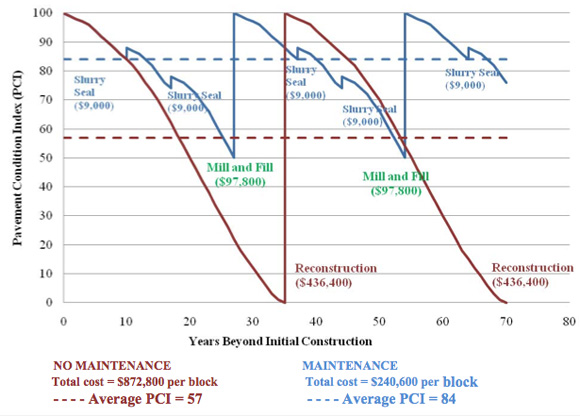Last week San Francisco voters approved a $248 million bond to fix streets, which means the city will soon begin the largest repaving expenditure in its history. For the next three years, San Francisco will spend more than three times the amount it has normally budgeted for street repairs. Ninety million dollars will go to bicycle, pedestrian, transit, and infrastructure improvements (we’ll have more on those projects next week).
“There’s a lot of pride from folks in the bike coalition in getting this passed,” said Kit Hodge, deputy director of the San Francisco Bicycle Coalition. SFBC helped draft the proposition, went door to door, and sent out 42,000 mailers on the issue. This support may have been crucial: The proposition exceeded the required two-thirds majority by just under 3,000 votes.
The bond can only do so much, however. It pays for only three years of work and is insufficient to complete the backlog of repaving projects. “This won’t totally fix all the deferred maintenance,” said Department of Public Works spokesperson Gloria Chan. “We still need to find a permanent funding source.”
The problem is that San Francisco has neglected its streets, failing to pay for preventive care since the early 1990’s. Putting things off until later -- deferred maintenance -- comes at a steep price. It’s actually cheaper to do maintenance more often and keep roads smooth. Engineers have estimated that it costs about three times as much to let streets deteriorate to a broken-down, pothole-scarred state.
Maintaining streets is one of those basic good-government policies that pretty much everyone agrees with. But it’s not sexy. Slurry seals never won fame for a politician. And so far, no one has stepped up to make a permanent solution to this problem.
While the bond is expected to pay for new bike and pedestrian infrastructure in addition to general maintenance, not every livable streets advocate supported the measure. Livable City director Tom Radulovich told Streetsblog in July that a better funding mechanism would reflect the costs that different people impose by using the streets: “As a driver, you’re not going to pay any more to drive, but as a non-driver I’m going to pay more for automobile infrastructure. We’re sending the wrong economic signals by continually hiding the true cost of motoring from drivers."
San Francisco Supervisor Sean Elsbernd voted against sending the measure to the ballot and thinks the city shouldn’t make a habit of borrowing to pay for road upkeep. “We’re going to get $248 million of work, but we’re going to pay over $400 million because of the interest,” he said.
Even Supervisor Scott Wiener, a strong supporter of the roads bond, said that debt financing shouldn’t be a permanent solution. “We’d deferred so much maintenance that this has become a capital expense, and a bond is appropriate for that,” he said. But he thinks that it’s neither rational to use debt to pay for routine maintenance or to ignore the problem. “I think there’s pretty much unanimous agreement that the status quo is unacceptable,” he said.
Much like Radulovich, Weiner believes that the best solution would be for the users of city roads to pay for their upkeep. He’s hoping that State Senator Mark Leno will write a law to enable San Francisco to charge residents a vehicle license fee. This year Governor Jerry Brown vetoed a bill that did just that, explaining that he wanted a solution for the whole state, not individual municipalities, but the governor may be warming to the idea, Elsbernd said.
“Maybe Brown’s recognized that the Republicans just aren’t interested in compromise,” he said.
There’s also a chance that the nine Bay Area counties will institute a gas tax, which, if passed, could help pay for street maintenance.





